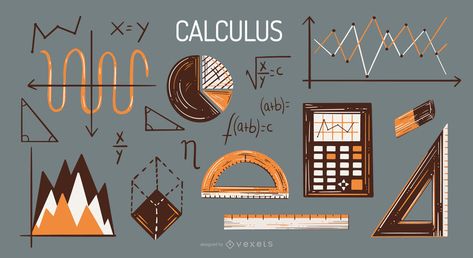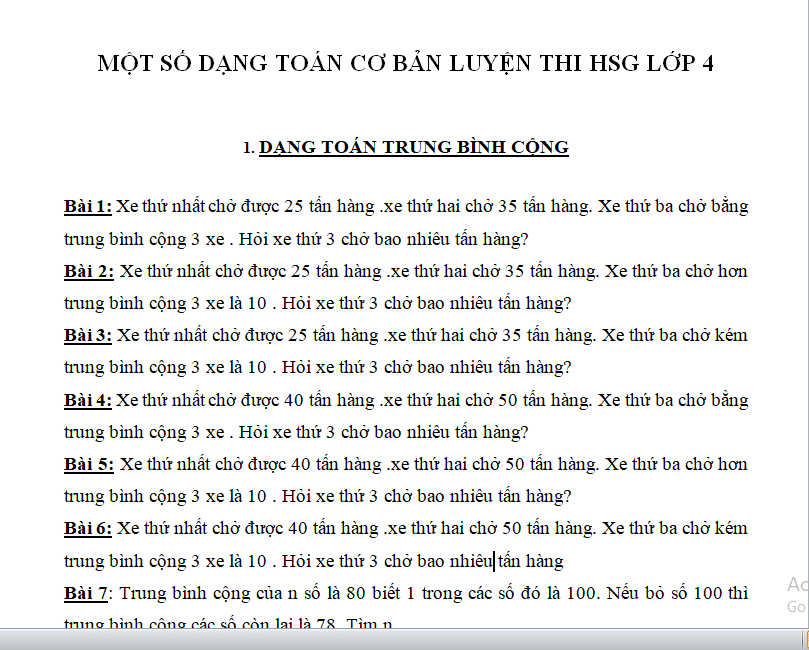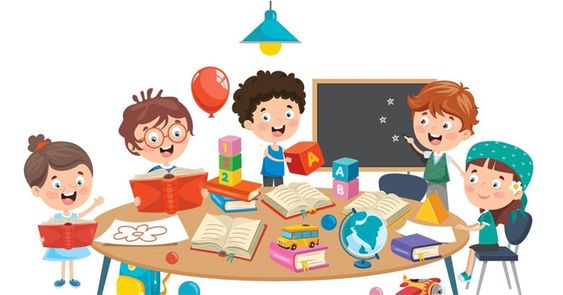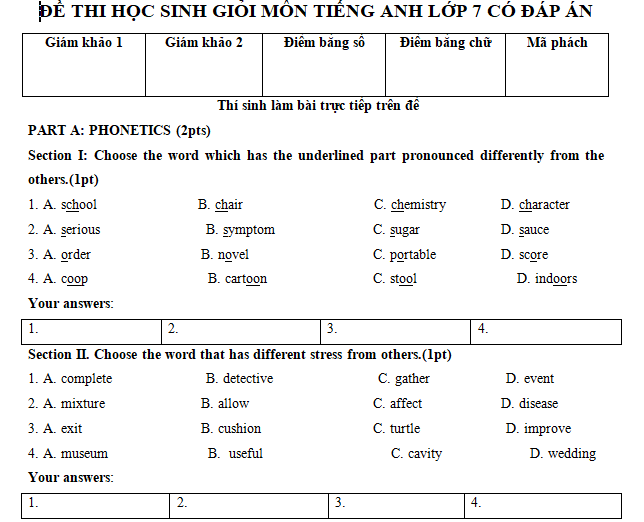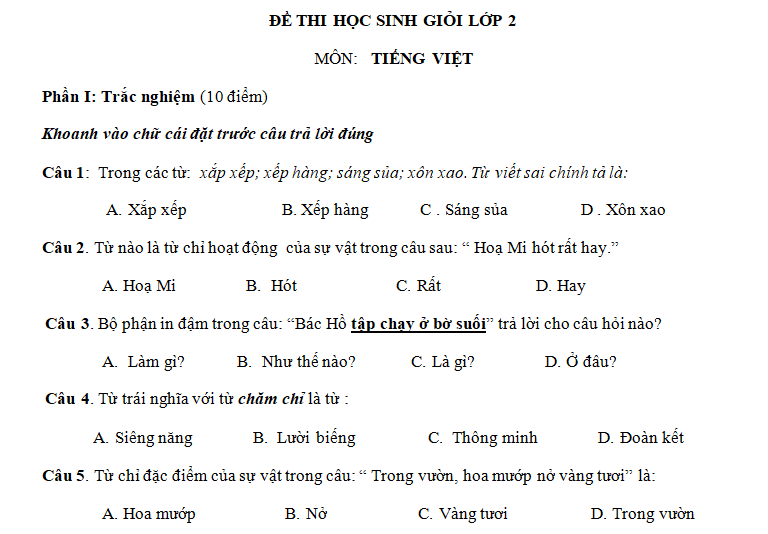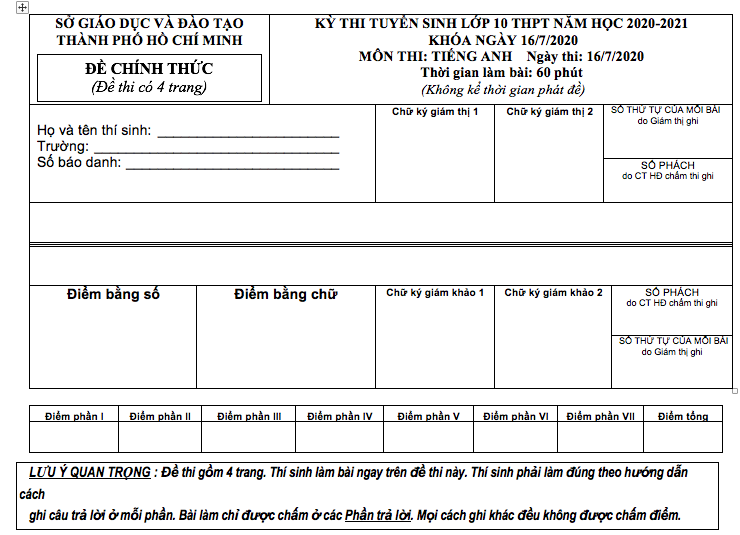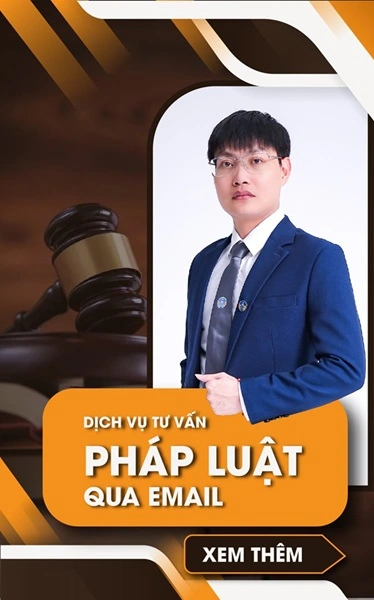Ôn luyện cho kỳ thi học sinh giỏi Tiếng Anh ở lớp 9 đòi hỏi sự chuẩn bị kỹ lưỡng và hiệu quả. Dưới đây là bài viết về chủ đề: Tuyển tập đề thi học sinh giỏi Tiếng Anh lớp 9 có đáp án, mời bạn đọc theo dõi.
Mục lục bài viết
1. Đề thi học sinh giỏi Tiếng Anh lớp 9 có đáp án mới nhất:
I. VOCABULARY: (30 points)
Part 1: Circle the letter (A, B, C or D) next to the word or phrase which best completes each sentence.
1. It’s a good idea to see your doctor regularly for …….
A. a revision
B. a control
C. an investigation
D. a check-up
2. Last year the potato harvest was very disappointing, but this year it looks as though we shall have a better …….
A. product
B. outcome
C. amount
D. crop
3. When the starter gave the …… all the competitors in the race began to run round the track.
A. signal
B. warning
C. shot
D. show
4…….. from Bill, all the students said they would go
A. Except
B. Only
C. Apart
D. Separate
5. The new manager explained to the staff that she hoped to ……… new procedures to save time and money.
A. manufacture
B. establish
C. control
D. restore
6. There is a fault at our television station. Please do not …….. your television set.
A. change
B. adjust
C. repair
D. switch
7. The crowd at a football match are often …….. .
A. excite
B. excited
C. exciting
D. excitement
8. I’m very …….. in the information you have given me.
A. concerned
B. surprised
C. bored
D. interested
9. I saw a thief take Peter’s wallet so I ran …….. him, but I didn’t catch him.
A. into
B. after
C. over
D. near
10. If it’s raining tomorrow, we shall have to……… the match till Sunday.
A. put off
B. cancel
C. play
D. put away
Đáp án
| Q# | 1 | 2 | 3 | 4 | 5 | 6 | 7 | 8 | 9 | 10 |
| Key | D | D | A | C | B | B | B | D | B | A |
Part 2: Read the text below. Use the word given in capitals at the end of each line to form a word that fits in the space in the same line.
Kids watch more TV
A study into children’s television (0) viewing habits reveals VIEW
that children whose parents have a high level of (1) _________________ EDUCATE
tend to watch less television than children from less educated
family(2) ________________ . The report also suggests that a high rate of BACK
TV watching among children in poorer (3) _________________ areas SUBURB
and in the provinces, compared to those living in large urban centre,
is often due to (4) _________________ and a lack of other kinds of POOR
(5) _________________ in the area. Disco, cinema, theatre and sports ENTERTAIN
(6) ________________ offer children in urban centre a wider range ACTIVE
of pastimes, which leads to far (7) ______________ hours being spent FEW
in front of the box. (8) ______________, comedies and adventure films COMMERCE
are children’s (9) _______________ programmes, while twenty per cent FAVOUR
of children said they preferred (10) _______________ films and thrillers. VIOLENCE
Xem đáp án
A study into children’s television (0) viewing habits reveals VIEW
that children whose parents have a high level of (1) ___education_______ EDUCATE
tend to watch less television than children from less educated
family(2) ______backgrounds_____ . The report also suggests that a high rate of BACK
TV watching among children in poorer (3) _____suburban_____ areas SUBURB
and in the provinces, compared to those living in large urban centre,
is often due to (4) _____poverty______ and a lack of other kinds of POOR
(5) ______entertainment_____ in the area. Disco, cinema, theatre and sports ENTERTAIN
(6) ____activities___ offer children in urban centre a wider range ACTIVE
of pastimes, which leads to far (7) _____fewer_____ hours being spent FEW
in front of the box. (8) ___Commercials_____, comedies and adventure films COMMERCE
are children’s (9) _____favourite____ programmes, while twenty per cent FAVOUR
of children said they preferred (10) _____violent______ films and thrillers. VIOLENCE
Part 3: Match each phrasal verb with the correct definition
| 1. fill in
2. turn into 3. go away 4. put away 5. run out of 6. get away with 7. join in 8. pick out 9. keep on 10. get over | A. participate
B. avoid punishment C. select, choose D. change into, become E. continue F. complete ( a form) G. leave H. recover from I. use up completely J. return something to its correct place |
Đáp án
| Q# | 1 | 2 | 3 | 4 | 5 | 6 | 7 | 8 | 9 | 10 |
| Key | F | D | G | J | I | B | A | C | E | H |
II. GRAMMAR (20 points)
Part 1: Use the correct forms of the verbs in the brackets to complete the passage below.
I (write) (1) ………………………………… to express my dissatisfaction of my stay at the Lord Hotel in London last weekend. I (book) (2) ……………………………….. the hotel in Sweden and also (receive) (3) ……………………….. information about the hotel. I (promise) (4) ………………………….. a luxury weekend. However, I (be) (5)………………………………. not satisfied. The room was comfortable, but the traffic from the road opposite the hotel (make) (6) ……………………………… it impossible to (sleep) (7) ………………………. I (ask) (8) ……………………………….. for another room, but no single rooms (be) (9) …………………………… available. I required room-service one night and I (have) (10) ……………………………. to wait for almost one hour before someone came.
Đáp án
1) am writing 2) booked 3) received 4) was promised 5) am not
6) made 7) sleep 8) asked 9) were 10) had
Part 2: Complete the sentences with the correct prepositions
1. She was very conscious (1)……………… her lack of experience on her first day at work.
2. He has a new solution (2)……………… the problem.
3. Nobody helped him. He managed it (3)……………… his own.
4. The drivers (4) ………………. London kept their cars (5) …………… the left.
5. The summer holiday is coming. We are all excited (6) …………….. going (7) …………. a long trip
(8) ………… the South.
6. The children were amazed (9) ……………….. the lion show at the circus.
7. Her small garden looks very beautiful in spring because all the flowers are (10) ……………….. full bloom.
III. READING: (25 points)
Part 1: Put ONE suitable word in each space
Miss Darby was one of those people who never threw anything away. “You never know when you might need it” was (1) ………. of her favorite sayings. She lived (2) ……. herself in a large Victorian house across the road from us. Although I never went to her house, I knew it was full (3) …….. antique furniture, Persian carpets and so on. In every room, there were dozens of paintings so that her house was (4) ………. an art gallery. I remember my father (5) ……… that she was a “ Staffordshire Darby” but I had (6) ……….. idea what he meant. I (7) ……… out years later that the Darby family had made their money from coal-mining in Staffordshire. We used to make up stories (8) …….. her. My sister Alice, (9) …….. was a romantic girl, told us that Miss Darby once had a lover, but he walked out one day and she (10) …… saw him again!
Part 2 : Read the following passage and answer the questions.
The world’s oceans are so vast that they can cope with the present levels of pollution. However, little is known about the long-term effects of such slow poisoning. The most serious problem of modern time is that man is destroying the earth’s natural resources and transforming huge areas into waste land. As a result, it is becoming extremely difficult to grow enough to feed the world’s rapidly increasing population. A way of protecting all wild life on the earth must also be found as many species are in danger of disappearing completely from the face of the earth. The smoke in the atmosphere, for example, is increasing so much that the amount of sunlight has been reduced in many cities. Man’s whole environment is being changed in a serious way.
1) What is the process of making something dirty ?
…….
2) Find a word or phrase from the passage with the same meaning as the air, water and land in which we live?
…….
3) What is the air surrounding the earth called?
…….
4) What could be best replaced wealth, goods or products people can use ?
…….
5) What is a difficulty which needs attention and thought ?
…….
Đáp án
1) The process of making something dirty is pollution.
2) A word or phrase with the same meaning as the air, water and land we live is environment.
3) The air surrounding the earth is called atmosphere.
4) Resources could be best replaced wealth, goods or products people can use
5) A difficulty which needs attention and thought is problem.
Part 3: Read the passage and decide which is the best answer. Circle the letter A, B, C or D next to the word you choose.
Paper is named for papyrus, a reed like plant used by ancient Egyptians as writing material more than 5000 years ago. The Chinese invented the paper that we use 2000 years ago.
A piece of paper is really made up of tiny fibers, unlike a piece of material. The fibers used in paper, however, are plant fibers, and there are millions of them in one sheet. In addition to the plant fiber, dyes and additives such as resin may be used. Dyes can make the paper different colors; resin may add weight and texture.
Where do these fibers come from ? The majority of paper is made from the plant fiber that comes from trees. Millions are cut down, but new trees are planted in their place. Paper may be also made from things like old rags or pieces of cloth. Wastepaper, paper that has been made and used, can be turned into recycled paper. This recycling process saves forest, energy and reduces air and water pollution.
1. According to the passage, the paper that we use was first invented by ___________.
A. the Chinese B. the Egyptians C. ancient cultures D. foresters
2. What is the main ingredient in most paper?
A. resin B. cardboard C. plant fiber D. papyrus
3. According to the passage, the primary source of the plant fiber used in paper is ________
A. rags B. trees C. fabric D. wastepaper
4. According to the passage, recycling paper is ______________
A. bad for the environment C. good for the environment
B. wasteful D. economical
5. According to the passage, recycling paper does all of the following EXCEPT ______________.
A. reduce the need for ink C. save energy
B. save forests D. reduce air pollution
D. WRITING: (25 points)
Part 1: Rewrite each sentence beginning as shown, so that the meaning remains the same.
Example: He wrote the letter in two hours.
It took him two hours to write the letter.
1. The keepers feed the lions at 3 pm every day.
The lions …….
2. We got lost because we didn’t have a map.
If we ………
3. I would prefer you to deliver the sofa on Friday.
I would rather……
4. The bridge was so low that the bus couldn’t go under it.
It was …….
5. That was a silly thing to say.
What …….
6. We’ve run out of tea.
There…….
7. I last saw him when I was a student.
I haven’t …….
8. Susan was too excited to sleep.
Susan was ……
9. Robert has not had a job for two years.
Robert has been …….
10. She will complete the work only she is paid extra.
She will not …….
Đáp án
1. The lions are fed at 3 pm every day
2. If we had had a map, we wouldn’t have got lost
3. I would rather you delivered the sofa on Friday.
4. It was such a low bridge that the bus couldn’t go under it.
5. What a silly thing to say!
6. There isn’t any tea left.
7. I haven’t seen him since I was a student.
8. Susan was so excited that she couldn’t sleep.
9. Robert has been out of job/ jobless/ unemployed for two years.
10. She will not complete the work unless she is paid extra/ if she is not paid extra.
Part 2 Use the words in the brackets to combine the following sentences.
1. All the students love the principal. He is very kind. (because of)
…….
2. I have forgotten the tickets. I’m sorry for it. (having)
…….
3. I saw it with my own eyes. I believed it. (if)
……
4. The house at the end of the street has been sold. It has been empty for years. (which)
……
5. It’s a pity he doesn’t take the doctor’s advice. (wish)
…….
Đáp án
1. All the students love the principal because of his kindness.
2. I’m sorry for having forgotten the tickets.
3. If I hadn’t seen it with my own eyes, I wouldn’t have believed it.
4. The house at the end of the street which has been empty for years has been sold.
5. I wish he took the doctor’s advice.
Part 3 : A friend of yours has written to you, asking for some advice. He wants to visit your country for three weeks this summer and would like to know which places to visit, where to stay, what sights to see, and what clothes to bring. Write to him, giving as many suggestions as you can and mentioning any national customs that may seem strange to him. (about 200 words)
2. Đề thi học sinh giỏi Tiếng Anh lớp 9có đáp án hay nhất:
I. LISTENING: ( 20 points)
Part 1: Listen to the interview with Saul Robbins about his daily life and choose the correct answer. You will hear the recording three times. (6 points)
1. Saul lives in ……..
A. Paris B. London C. New York
2. He is a ……
A. director B. reporter C. producer
3. He works for ……
A. a newspaper B. a radio station C. a TV station
4. He goes to work at ……. in the afternoon.
A. two B. four C. five
5. When he gets up he ……. first.
A. brushes his teeth B. has a shower C. gets dressed
6. He has …… for breakfast.
A. some toast B. some ice-cream C. a cup of coffee
7. He goes to work ….
A. on foot B. by car C. by train
8. He finishes work at …… in the morning.
A. two B. four C. five
9. After work he goes for a ….. with his friends.
A. walk B. drink C. meal
10. He …… travels to other countries.
A. sometimes B. usually C. never
11. He ……his job.
A. likes B. doesn’t like C. hates
12 In his free time, he plays …….
A. tennis B. football C. badminton
Đáp án
| Q # | 1. | 2. | 3. | 4. | 5. | 6 | 7 | 8 | 9 | 10 | 11 | 12 |
| Key | C | B | A | C | B | C | A | A | B | C | A | A |
Part 2:. Listen and write down the times in words. You will hear the recording three times. (9 points)
1………………………………………… 6. ………………………………………………….
2. ………………………………………. 7. ………………………………………………….
3 ……………………………………….. 8. …………………………………………………..
4………………………………………… 9. …………………………………………………..
5…………………………………………
Đáp án
1. Five past one.
2. Ten o’clock.
3. Twenty past nine.
4. Twenty – three minutes past two.
5. Eighteen minutes past three.
6. Quarter to eight.
7. Half past seven.
8. Twenty – five past eleven.
9. Ten to twelve.
Part 3: Listen to the interview and answer the questions. You will hear the recording three times. (5 points)
1. Where did Julia go for her holiday? ….
2. How did she go there? ……..
3. How long did the journey take? ………
4. Where did she stay? …….
5. What things did she do? ……
Đáp án
1. Scotland.
2. By train.
3. About five hours.
4. At her friends’flat.
5. She visited the castles and did a lot of shopping.
II.VOCABULARY & GRAMMAR: (33 points)
Part 1: Choose the correct answer among A, B, C or D. (10 points)
1. When the party was _____ we helped them clear up the house.
A. up B. off C. out D. over
2 Jack can’t remember _____ the telephone number down.
A. write B to write C. writing D. written
3. Has Sue finished _____ yet?
A. washing up B. to wash up C. wash up D. wash upping
4. Jane stopped the car _____ a newspaper.
A. buying B. to buy C. buy D. bought
5. I _____ your name. Could you tell me again?
A. am forgetting B. ’ve been forgettingC. ’ve forgotten D. was forgetting
6. There you are! I _____ for two hours. Where’ve you been?
A. am waiting B. wait C. waited D. have been waiting
7. This job ______ working very long hours.
A. involves B. consists C. includes D. contains
8. “Have they arrested the thieves yet?” “It’s only a _______ of time.”
A. period B. matter C. length D. waste
9. Just think, ______ two years’ time, we’ll be 18!
A. under B. over C. after D. in
10. I’ll give you ten minutes to come ______ with a better idea.
A. out B. in C. through D. up
Đáp án
| Q # | 1. | 2. | 3. | 4. | 5. | 6 | 7 | 8 | 9 | 10 |
| Key | D | C | A | B | C | D | A | B | D | D |
Part 2: Complete the interview using the past simple, present perfect simple, or present perfect continuous. More than one tense may be possible (15 points)
James: Dave, I haven’t seen (see) you for a long time.
Dave: No well, I _____________ (1 live) in West London for the last few
years.
James: Right! So what _____________ you _____________ (2 do)?
Dave: Well, I _______________ (3 work) for a film company for the last two years.
James: Wow! A film company. That’s glamorous!
Dave: No, not really. It’s hard work. I’m an assistant director.
James: _______________ you ___________ (4 meet) anyone famous?
Dave: Well, yes! I _____________ (5 work) with some famous people in the time I’ve been there. Last year we __________ (6 make) a film with Jack Anderson.
James: Wow! I _______ (7 see) him in a film last week. He’s really brilliant!
Dave: And I _________ (8 film) with Belinda Barker a couple of months ago.
James: You lucky thing!
Dave: Oh, yeah, and I __________ also_________ (9 become) friends with Matt
Harper. We __________________ (10 meet) on the last film I worked on.
James: What ___________ you ____________ (11 do) this year?
Dave: Well, I _________________ (12 finish) work on a comedy, and for the past
couple of weeks I _________________ (13 help) the director to cast a new
romantic comedy.
James: What ____________ you _______________ (14 work) on today?
Dave: I’m afraid I can’t tell you. It’s a secret! Anyway, enough about me! What
__________ you _____________ (15 do) lately?
Đáp án
1. ’ve been living 2. have ….been doing 3. ’ve worked/’ve been working
4. Have …. met 5. ’ve worked 6. made 7 saw
8. filmed 9 ’ve become 10. met
11 have …. done/have …. been doing 12. finished/ ’ve finished
13. ’ve been helping 14. have been working 15. have …. been doing
Part 3: Use the words in capital to form a word that fits in the spaces 1–8 in the text. (8 points)
(0) Original Olympic Games began in Ancient Greece in ORIGIN
BC 776 in Olympia. The Games were very popular and were held
(1) …………………………… every four years until AD 393 when they were REGULAR
stopped by the Roman Emperor. The modern games were started
again in Athens in 1896.
The Games have become the World’s most important international
athletics (2) …………………. , in which the best athletes spend years training COMPETE
in (3) ………………………………. for this great event. Sports range from PREPARE
basketball to horse riding. Perhaps the most (4) ………………….. track and CHALLENGE
field event is the decathlon. Athletes take part in ten different running,
jumping and throwing events.
Almost every nation sends a team to the Olympic Games and
one of the ideas is that the Games encourage (5) …………………………. FRIEND
between countries. (6) ……………………….. sports lovers travel thousands of DEDICATE
miles to watch the Games and most (7) ……………………… athletes want the AMBITION
chance of winning an Olympic medal. Such an (8) ………………………… can ACHIEVE
make them known throughout the world.
Đáp án
1. regularly 2. competition 3. preparation 4. challenging
5. friendship 6. Dedicated 7. ambitious 8. achievement
III. READING: (22 points)
Part 1: Read the passage and choose the best answer. (10 points)
It’s always worth preparing well for an interview. Don’t just hope (1) ………… the best. Here are a (2) ………… tips. Practise how you say things, as well as what you (3) ………… to say. If you don’t own a video camera, perhaps a friend of (4) ………… does. Borrow it and make a video tape of yourself. Find (5) ………… to watch it with you and give you a (6) ………… of advice on how you appear and behave. Before the interview, plan what to wear. Find out how the company expects its (7) ………… to dress. At the interview, believe (8) ………… yourself and be honest, open and friendly. (9) ………… attention and keep your answers to the point. The interviewer doesn’t want to waste time and (10) ………… do you.
| 1. A | against | B. | for | C | to | D | at |
| 2. A | little | B. | several | C | few | D | lot |
| 3. A | intend | B. | consider | C | imagine | D | think |
| 4. A | his | B | yours | C | mine | D | ours |
| 5. A | anybody | B | nobody | C | everybody | D | somebody |
| 6. A | number | B | slice | C | plenty | D | bit |
| 7. A | colleagues | B | employees | C | customers | D | employers |
| 8. A | in | B | of | C | with | D | by |
| 9. A | Attract | B | Give | C | Turn | D | Pay |
| 10. A | so | B | either | C | neither | D | or |
Đáp án
| Q # | 1. | 2. | 3. | 4. | 5. | 6 | 7 | 8 | 9 | 10 |
| Key | B | C | A | B | D | A | B | A | D | C |
Part 2: Choose from sentences A–H the one which fits each gap 1–6. There is one extra sentence you do not need to use. (12 points)
A. Industries have polluted the water, fishing has destroyed sea life and divers have
damaged large parts of the coral.
B. The crew were helpful and pleasant and the price was also very reasonable.
C. Altogether, it was a wonderful trip.
D. I’m not sure I would go again.
E. It stretches for 2000 kilometres and is up to 800 metres wide.
F. However, I didn’t think I could take part in a dive cruise and not dive.
G. At no point were we permitted to swim away on our own.
H. I was right it was an incredible sight.
| A Natural Wonder
When I was asked to visit and write about the Great Barrier Reef, I was thrilled. I had heard reports of damage done by tourism and other industries, but felt that the Reef would still be a wonderful place to see. From the air, the Great Barrier Reef seems huge. I wasn’t sure how best to explore such a giant place, so after I had landed, I made enquiries and was told the best way to see the Reef is to take a dive cruise. I booked a place on a three-day cruise, and, despite warnings about the state of some of these boats, the boat I was on was comfortable and clean. I was entitled to eight dives plus use of wet suit, flippers and other equipment, three meals a day and two nights’ accommodation. Although I have been diving before, I am not an experienced diver. I was nervous to begin with, but soon felt completely safe. We were divided into groups according to our ability and each group was given an instructor. They had very strict rules. With our guides, we saw some amazing sea life including small sharks, crabs and thousands of colourful tropical fish swimming around in the coral. The other divers were friendly and the evenings on board were very pleasant. While I was at the Great Barrier Reef, it became perfectly clear from the conservation programmes I came across, that the damage I had heard about had been done. Environmental groups have done much to stop this damage, but sadly it continues. Despite this, the Great Barrier Reef is a wonderful place to go. For me at least it is one of the most significant natural wonders our earth has to offer. |
Đáp án
| Q # | 1. | 2. | 3. | 4. | 5. | 6 |
| Key | E | B | F | G | C | A |
IV. WRITING: (25 points)
Part 1: Complete the second sentence so that it has the similar meaning to the first sentence using the word given. Do not change the word given. (12 points)
EX: The programme only finished a minute ago. just The programme has just finished
1. It’s a pity I can’t go to the game next Saturday. wish
I ______________________________________________________
2. Do I have to fill in any forms?. necessary
Is ______________________________________________________?
3. I only found out the truth because I heard the two of them talking. found
If I ____________________________________________________
4. It is necessary that I post this letter tonight. need
I ______________________________________________________
5. This food is so good that I’m going to have some more. such
This ___________________________________________________
6. Could you give me some advice? like
I ____________________________________________________——_—
7. “Please don’t smoke in the house.” she said to us. to
She ___________________________________________________-
8. “Why didn’t you mention the problem before?” I asked them. had
I asked them ____________________________________________
9. You are unfit because you don’t do enough exercise. would
If ___________________________________________________
10. I bought myself some good new clothes. I need them for my new job. which
I bought ________________________________________________
Đáp án
1. I wish I could go to the game next Saturday.
2. Is it necessary for me to fill in any forms?
3. If I hadn’t heard the two of them talking, I wouldn’t have found out the truth.
4. I need to post this letter tonight.
5. This is such good food that I’m going to have some more.
6. I’d like you to give me some advice.
7. She told us not to smoke in the house.–
8. I asked them why they had not mentioned- the problem before.
9. If you did enough exercise you would be fit.
10. I bought myself some good new clothes which I need for my new job.
3. Các ôn luyện kỳ thi học sinh giỏi Tiếng Anh lớp 9:
Ôn luyện cho kỳ thi học sinh giỏi Tiếng Anh ở lớp 9 đòi hỏi sự chuẩn bị kỹ lưỡng và hiệu quả. Dưới đây là một số gợi ý ngắn gọn để ôn luyện:
– Xem lại kiến thức cơ bản: Đầu tiên, hãy ôn lại các kiến thức cơ bản từ sách giáo trình và bài giảng. Nắm vững ngữ pháp, từ vựng, và cấu trúc câu.
– Luyện nghe: Nghe là một phần quan trọng trong kỳ thi. Luyện nghe qua việc nghe các bản tin, podcasts, và video có phụ đề. Bạn cũng có thể sử dụng các bài kiểm tra nghe trực tuyến.
– Mở rộng từ vựng: Học thêm từ vựng mới hàng ngày từ nhiều nguồn khác nhau. Sử dụng từ điển và ứng dụng học từ vựng.
– Thực hành đọc: Đọc nhiều loại văn bản khác nhau từ tin tức, bài học, đến văn bản văn học. Chú ý đến cách tìm hiểu ý chính, ý phụ, và chi tiết trong văn bản.
– Viết hàng ngày: Hãy thực hành viết bằng cách viết nhật ký, bài luận, hoặc đơn giản là viết mô tả về những sự kiện xung quanh bạn.
– Thực hành nói: Nói tiếng Anh hàng ngày với bạn bè, gia đình hoặc thậm chí với chính bản thân mình. Tham gia các buổi thảo luận, thực hành câu đàm thoại.

